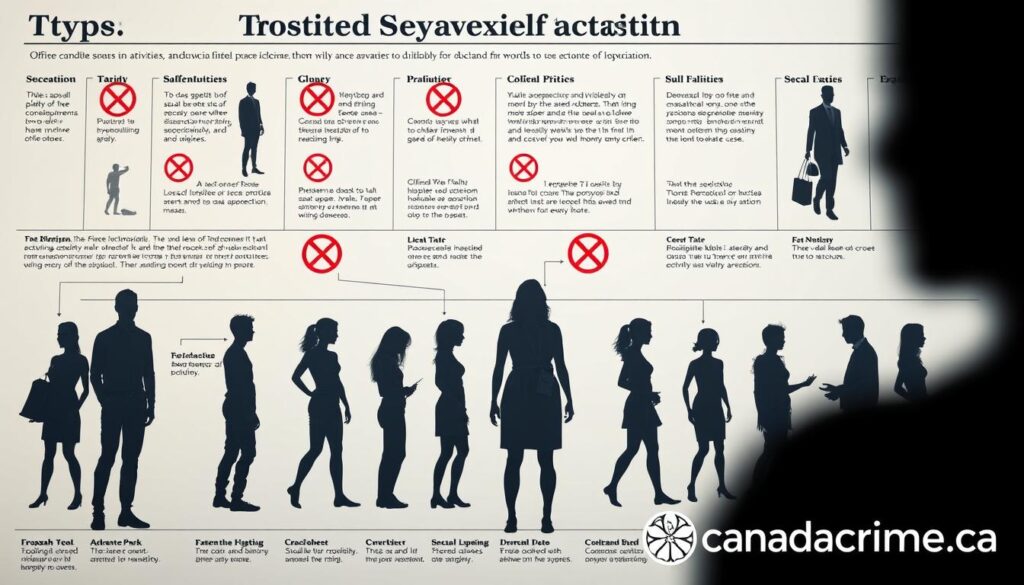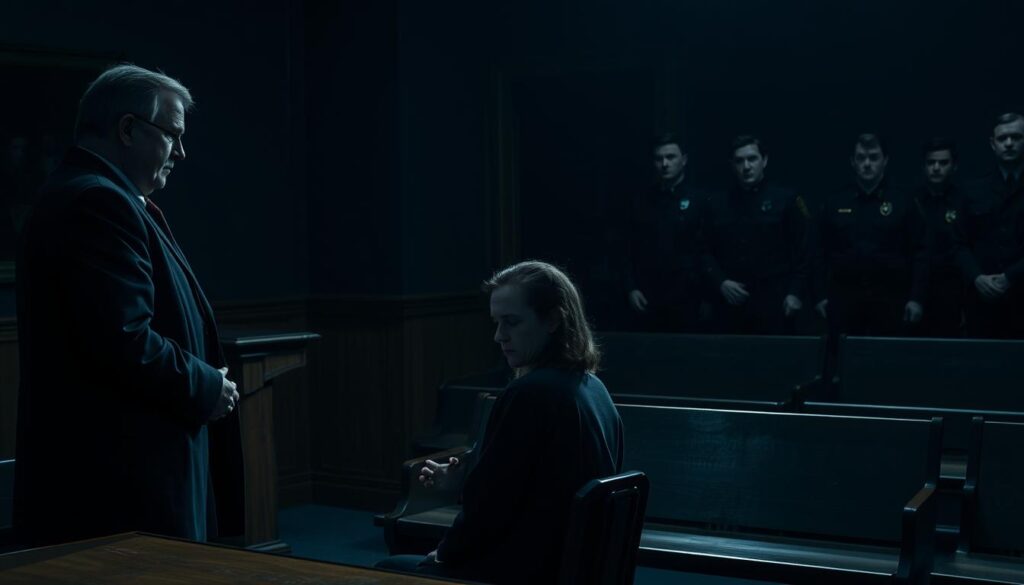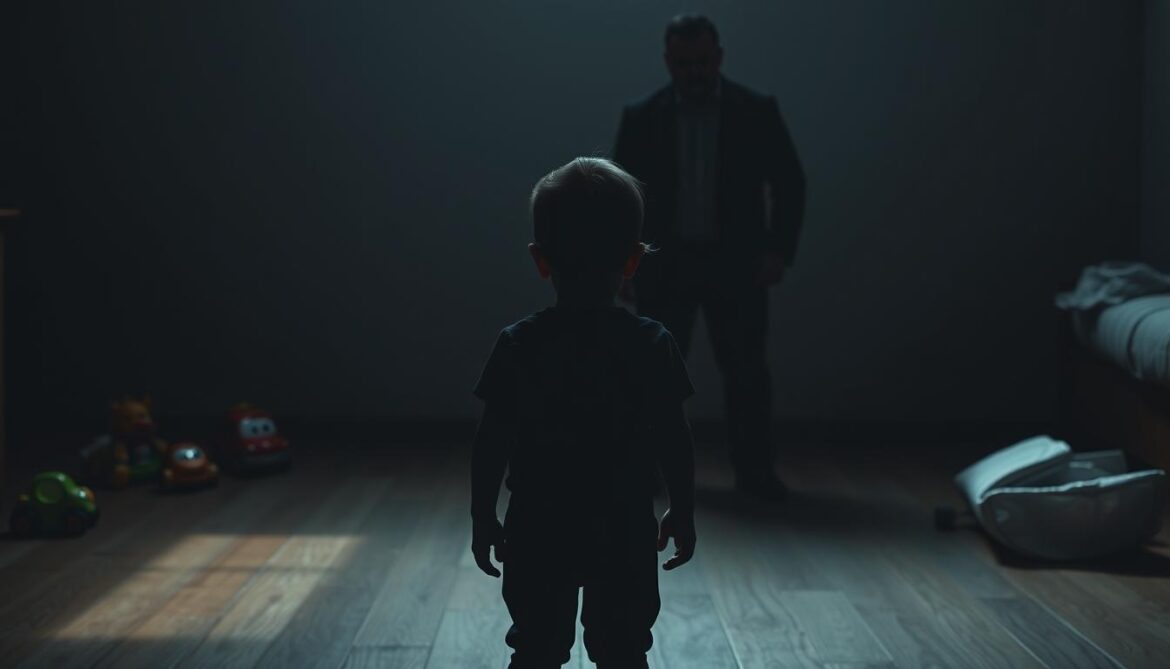Canada reports nearly 9,000 child exploitation cases yearly. Many occur in homes where adults fail to protect minors. Canadian law takes a firm stance against those enabling such harmful activities.
Section 171 of the Criminal Code targets those who control premises. It punishes anyone who knowingly allows underage individuals for prohibited intimate activities. This includes property owners, occupiers, managers, and assistants.
The penalties for this offense are severe. If convicted, you face a mandatory minimum sentence of one year in jail. The maximum sentence can extend up to 14 years.
This offense is among the most harshly punished in Canadian youth protection law. It shows Canada’s dedication to safeguarding young people.
The mandatory minimum sentencing structure emphasizes the gravity of this crime. Understanding your legal duties regarding minors on your property is vital. Ignorance of the law doesn’t protect against these charges.
The Legal Framework of Household Permitting Prohibited Sexual Activity
Canadian law defines specific rules for household permitting of prohibited sexual activity. These rules are found in the Criminal Code under “Sexual Offences, Public Morals and Disorderly Conduct.” This framework helps identify when household members may be liable for allowing sexual misconduct.
Legal Definition and Scope
Household permitting prohibited sexual activity means knowingly allowing illegal sexual acts on one’s property. This law focuses on property owners’ duty to prevent illegal sexual conduct on their premises.
The law extends beyond property ownership. It requires those in control of premises to know about and stop prohibited sexual activity. This creates legal accountability for enabling such behavior.
Terminology in Canadian Law
“Knowingly permits” means being aware and allowing the activity. “Premises” includes any property under a person’s control, like homes or apartments.
“Prohibited sexual activity” covers various illegal sexual acts, especially those involving minors or non-consenting adults. Courts interpret these terms strictly in domestic sexual abuse cases.
Jurisdictional Considerations
The Criminal Code applies across Canada, but enforcement may vary between provinces. Local agencies may develop specific approaches based on community needs.
These variations can affect case priorities and prosecution. However, the basic legal principles remain the same nationwide.
Historical Development of the Legislation
Laws on household permitting of prohibited sexual activity have changed over time. Major revisions occurred in 1985, 2005, 2008, 2012, and 2015.
These changes have improved protections for vulnerable people, especially minors. The 2005 and 2012 updates strengthened measures against sexual exploitation.
This legal evolution reflects changing views on child protection and sexual consent. What was once private is now an area needing strong legal action to protect the vulnerable.
The Criminal Code of Canada: Section 171 Explained
Section 171 of Canada’s Criminal Code targets property controllers who allow prohibited sexual activities involving minors. This law creates a significant legal duty to protect young people from exploitation and family violence.
Property owners and managers could face severe legal consequences for permitting such activities. Understanding this provision is crucial for those responsible for any premises.
Key Elements of the Offense
Section 171 outlines penalties for knowingly allowing underage individuals on premises for prohibited sexual activities. Offenders face up to 14 years in prison, with a minimum one-year sentence.
This law applies to owners, occupiers, managers, and anyone controlling or assisting in property management. It covers various premises, including homes, apartments, and hotel rooms.
Actus Reus (Guilty Act)
The actus reus includes being a property controller and permitting an underage person on the premises. The minor’s presence must be for engaging in prohibited sexual activities.
Mens Rea (Guilty Mind)
Prosecutors must prove you knowingly permitted the prohibited activity. This means you were aware of the minor’s presence and purpose.

Legal Interpretation and Precedents
“Knowingly permits” includes deliberately ignoring obvious signs of prohibited activity. Canadian courts take a strict approach to enforcing Section 171.
Landmark Court Decisions
The Supreme Court emphasized protecting children from sexual exploitation as a fundamental Canadian value. This includes situations involving incest.
In R. v. Magoon, the court established that property controllers must take action when aware of potential exploitation. Failing to act can be considered “permitting” under the law.
These rulings show courts’ commitment to enforcing Section 171, especially when minors are at risk in household settings.
Types of Prohibited Sexual Activities Under Canadian Law
Canadian law outlines various forms of prohibited sexual conduct. Homeowners must prevent these activities on their premises. Understanding these offenses helps property owners avoid criminal liability under Section 171.

Age-Related Sexual Offenses
Age-related sexual offenses target activities involving minors. They aim to protect young people from exploitation. Canadian law uses age of consent instead of “statutory rape” terminology.
Age of Consent Provisions
In Canada, the general age of consent for sexual activity is 16 years. The law includes “close-in-age exemptions” for adolescents. These exemptions recognize developmental realities for young people.
- 12-13 year-olds can consent with partners less than 2 years older
- 14-15 year-olds can consent with partners less than 5 years older
- 16-17 year-olds can generally consent, except with persons in positions of trust or authority
These rules balance protection of minors with adolescent development. Any activity outside these parameters could trigger Section 171 liability if permitted in your home.
Non-Consensual Sexual Activities
Canadian law prohibits all non-consensual sexual activity. Sexual assault is defined in sections 271-273 of the Criminal Code. It ranges from unwanted touching to aggravated assault involving weapons or bodily harm.
Consent must be affirmatively given and can be withdrawn anytime. Consent cannot be legally given in certain circumstances.
- A person is incapable of consenting (due to intoxication, unconsciousness, etc.)
- Consent is obtained through abuse of trust, power, or authority
- A person expresses, by words or conduct, a lack of agreement
Exploitation and Abuse
The Criminal Code targets exploitative sexual conduct. These offenses include sexual interference, invitation to sexual touching, and sexual exploitation.
| Offense | Criminal Code Section | Description | Maximum Penalty |
|---|---|---|---|
| Sexual Interference | Section 151 | Touching a person under 16 for sexual purposes | 14 years imprisonment |
| Invitation to Sexual Touching | Section 152 | Inviting a person under 16 to touch themselves or another person for sexual purposes | 14 years imprisonment |
| Sexual Exploitation | Section 153 | Sexual contact with a young person by a person in position of trust or authority | 14 years imprisonment |
| Incest | Section 155 | Sexual relations with a known blood relative | 14 years imprisonment |
Sexual grooming is covered under luring a child (Section 172.1) and making sexually explicit material available to a child (Section 171.1).
Power Imbalance Considerations
Canadian law emphasizes sexual activities involving power imbalances. Persons in positions of trust face stricter legal standards. This includes teachers, coaches, employers, guardians, and healthcare providers.
Homeowners should know that allowing these activities on their property could lead to criminal charges. This applies even if they’re not directly involved in the sexual activity.
Legal Responsibilities of Household Members
Canadian law sets clear duties for those who control premises. They must prevent prohibited sexual activities in their homes. Section 171 of the Criminal Code targets those who allow minors on their property for illegal sexual acts.
This creates significant legal obligations for property owners, tenants, and other household members. They must protect minors and vulnerable persons from sexual exploitation on their premises.
Duty to Protect Minors and Vulnerable Persons
This responsibility extends beyond parents to anyone controlling a property. You must take reasonable preventative measures if you suspect illegal activities on your premises. These can include monitoring visitors, setting clear adult supervision rules, and investigating suspicious behavior.

Household members are uniquely positioned to prevent crimes like pedophilia and child pornography. They control access to private spaces where such activities might occur.
Knowledge Requirements for Criminal Liability
For criminal liability under Section 171, prosecutors must prove you “knowingly permitted” the prohibited activity. This knowledge requirement is crucial to the offense.
Actual vs. Constructive Knowledge
Courts distinguish between two types of knowledge when determining liability:
| Type of Knowledge | Definition | Legal Standard | Example |
|---|---|---|---|
| Actual Knowledge | Direct awareness of prohibited activities | Highest level of culpability | Witnessing illegal activity but allowing it to continue |
| Constructive Knowledge | Should have known based on circumstances | Reasonable person standard | Ignoring obvious signs of prohibited sexual activity |
| Willful Blindness | Deliberately avoiding knowledge | Treated similarly to actual knowledge | Refusing to investigate suspicious circumstances |
Failure to Act as a Form of Permitting
You can be held criminally liable for not intervening when aware of prohibited sexual activities. This passive permission is enough for conviction under Section 171.
For example, if you discover child exploitation in your basement and do nothing, your inaction could be “permitting”. Courts consistently hold that awareness creates a legal duty to take reasonable steps to stop such activities.
Penalties and Sentencing for Household Permitting Prohibited Sexual Activity
Canadian courts treat household permitting prohibited sexual activity as a serious offense. Penalties are harsh, reflecting the gravity of these crimes against vulnerable people. The justice system aims to punish offenders and deter similar conduct.
Criminal Sanctions
Courts convict individuals under Section 171 of the Criminal Code for this indictable offense. The severity of this crime is highlighted by its classification as an indictable offense.
Imprisonment Terms
The Criminal Code sets a mandatory minimum imprisonment of one year for this offense. Judges can impose up to 14 years imprisonment, depending on case specifics.

Courts often impose financial penalties on convicted offenders. These may include victim surcharges and restitution to those harmed. Financial burdens serve as an additional deterrent and acknowledge the harm caused.
Aggravating and Mitigating Factors
Judges consider various factors when determining sentences within the statutory range. Aggravating factors typically result in harsher sentences. Mitigating factors may lead to sentences closer to the minimum.
- Young age of victims involved in the prohibited activities
- Particularly harmful or degrading sexual activities
- Prior criminal history, especially sexual offenses
- Position of trust or authority over victims
- Financial benefit from permitting the activities
Mitigating factors include genuine remorse and cooperation with authorities. Steps taken to prevent future occurrences may also be considered.
Sex Offender Registry Requirements
Conviction under Section 171 requires mandatory registration with the Sex Offender Information Registration Act (SOIRA). This is classified as a “primary offense” under the Criminal Code. SOIRA registration is automatic upon conviction.
| SOIRA Requirement | Duration | Impact on Offender | Reporting Frequency |
|---|---|---|---|
| Registration Information | 10 years to life | Personal details on national database | Annual minimum |
| Address Reporting | Throughout registration | Must report any change of residence | Within 7 days of change |
| Travel Notification | Throughout registration | Must report absences of 7+ days | Before departure |
| Employment Updates | Throughout registration | Must report employment changes | Within 7 days of change |
Registry requirements create long-lasting consequences beyond the initial sentence. These affect employment opportunities, housing options, and community reintegration. Such measures show Canada’s commitment to protecting vulnerable individuals from exploitation and abuse.
Provincial Variations in Law Enforcement and Prosecution
Canada’s provinces and territories show notable differences in enforcing and prosecuting household sexual activity cases. These variations reflect regional priorities, resources, and legal traditions. The application of Section 171 varies across the country.
Quebec’s Approach to Household Sexual Offenses
Quebec’s civil law tradition shapes its handling of domestic sexual abuse cases. The province has specialized prosecution protocols that complement federal criminal law. Quebec’s Director of Criminal and Penal Prosecutions (DPCP) has dedicated units for sexual offenses.
Quebec has training programs for law enforcement officers on household permitting offenses. This approach ensures consistent application of child protection laws and federal criminal statutes.

Ontario’s Enforcement Strategies
Ontario has specialized prosecution teams for sexual offenses, including household permitting. The province coordinates criminal justice and children’s aid societies for comprehensive case management. Ontario’s Victim/Witness Assistance Program supports victims of family violence.
Specialized Crown attorneys with extensive training handle these sensitive cases. They guide victims through the legal process with care and expertise.
Western and Northern Territories’ Challenges
Western provinces and northern territories face unique challenges in enforcing Section 171. Remote communities often lack specialized investigative resources. This creates barriers to timely intervention in household permitting cases.
In northern territories, geographical isolation can delay investigations and prosecutions. Indigenous communities require culturally sensitive approaches that respect traditional governance. These approaches must also ensure child protection.
The Criminal Code applies to Canadian citizens who commit sexual offenses involving children abroad. This ensures that perpetrators cannot escape justice by crossing borders.
Reporting Obligations and Investigative Process
Reporting suspected household sexual activity is often a legal duty in Canada. The legal system protects victims of sexual offenses, including incest and statutory rape. These laws ensure proper justice for victims.
Mandatory Reporting Laws
Canadian provinces require reporting suspected child abuse or exploitation. These laws protect vulnerable individuals from harm. Most provinces mandate reporting if someone reasonably believes a child is being sexually abused.
Failing to report can lead to fines or jail time. These laws create a safety net for vulnerable people in communities.
Professional Obligations
Professionals working with children have stricter reporting duties. Teachers, healthcare providers, and social workers must report suspected abuse immediately. They receive training to spot signs of sexual abuse, incest, or statutory rape.

Professionals may face disciplinary action and legal penalties for failing to report. Their regulatory bodies hold them to higher standards than ordinary citizens.
How to Report Suspected Cases
Contact local child protection services or police if you suspect household sexual activity. Reasonable suspicion is enough to make a report. You don’t need absolute proof.
When reporting, provide as much detail as possible. Include names, addresses, and the child’s age and location.
- Names and addresses of the child and family members
- The child’s age and current location
- Nature and extent of suspected abuse
- Any immediate safety concerns
| Province | Child Protection Agency | 24-Hour Hotline | Online Reporting Available |
|---|---|---|---|
| Ontario | Children’s Aid Society | 1-833-999-KIDS | Yes |
| Quebec | Director of Youth Protection | 1-800-361-5310 | No |
| British Columbia | Ministry of Children and Family Development | 1-800-663-9122 | Yes |
| Alberta | Child and Family Services | 1-800-387-KIDS | Yes |
Investigation Procedures
Authorities follow set protocols to investigate allegations. Police and child protection services work together, especially in statutory rape or incest cases.
Evidence Collection
Investigators gather witness statements, physical evidence, and digital communications. Medical exams can be crucial in sexual abuse cases. Evidence collection follows strict rules for court admissibility.
Judges must ask if victims have been given a chance to seek restitution. This shows the importance of thorough evidence collection during investigations.
Victim Interviews
Interviews with potential victims, especially children, are handled carefully. Trained interviewers use child-friendly facilities. These interviews aim to gather accurate information while reducing trauma.
Many places use a single-interview approach to limit a child’s retelling of traumatic events. Video recording interviews can prevent repeated testimonies.
Legal Defenses in Household Permitting Cases
Canadian law offers several defense options for household permitting charges. These charges involve knowingly allowing minors on premises for prohibited sexual activities. Understanding potential defenses is crucial for those facing such allegations.
Lack of Knowledge Defense
The knowledge requirement is key in Section 171 offenses. Defendants may claim they were unaware of illegal activities on their property. This defense focuses on proving a lack of awareness, not just negligence.
Courts examine circumstantial evidence to evaluate this defense. They look at the defendant’s relationship to the victim and the premises layout. Proving lack of knowledge is harder in sexual grooming cases with potential warning signs.

Reasonable Steps Taken
Another strategy is showing immediate action upon discovering potential illegal activities. This could include removing individuals engaged in prohibited conduct and contacting law enforcement promptly.
Courts look for evidence of genuine and timely intervention. This is especially true in cases involving potential pedophilia.
Constitutional Challenges
Some defendants challenge Section 171 on constitutional grounds. They may claim the law is too vague, broad, or imposes unfair punishment.
Charter Rights Considerations
Challenges may be based on the Canadian Charter of Rights and Freedoms. Defendants might argue that Section 171 violates protected rights like freedom of expression.
Courts usually interpret Section 171 broadly to protect minors. Successful challenges must show the law overreaches its purpose of preventing child exploitation.
Support Systems for Victims and Affected Families
Canada offers robust support networks for victims of domestic sexual abuse and their families. These systems address immediate and long-term needs of survivors. They aim to provide healing, justice, and restoration while helping families recover.

Crisis Intervention Services
Immediate intervention is crucial when sexual abuse is discovered. Specialized crisis services operate 24/7 across Canada to assist victims. These services include emergency shelters, crisis lines, and hospital-based treatment centers.
Sexual Assault Response Teams coordinate police, medical professionals, and victim advocates. They ensure comprehensive care during critical hours after abuse disclosure. These teams preserve evidence while minimizing additional trauma to victims.
Urban centers typically offer more immediate resources than rural areas. However, mobile crisis units increasingly serve remote communities to bridge this gap.
Long-term Psychological Support
Recovery from sexual trauma requires ongoing psychological support. Victims often experience complex trauma that needs specialized treatment approaches. Trauma-focused cognitive behavioral therapy has proven effective for younger victims.
Various therapeutic options are available through community mental health centers and specialized recovery programs. Many communities offer family therapy to rebuild trust within affected families.
Legal Advocacy for Victims
Legal advocates support survivors throughout the criminal justice process. They explain procedures, prepare victims for court, and protect their rights. Advocates help craft victim impact statements, ensuring survivors’ voices are heard during sentencing.
Additional legal support includes court accompaniment, assistance with protective measures, and coordination with prosecutors. These services aim to empower victims throughout legal proceedings.
Victim Compensation Programs
Each Canadian province administers compensation programs for victims of violent crimes. These programs cover medical expenses, counseling services, lost income, and relocation costs. You can access these programs even without criminal charges, though abuse documentation is typically required.
Specialized funds exist for families affected by child pornography cases. These programs recognize that healing often requires sustained support over many years.
Conclusion
Canadian law sets clear rules for property owners about illegal sexual activities. Section 171 of the Criminal Code outlines serious penalties for allowing such acts involving minors on your premises.
The law imposes hefty punishments for permitting underage sexual activities. Offenders face up to 14 years in prison, with a minimum one-year sentence.
Property controllers must actively prevent sexual exploitation of youth. This includes proper supervision, clear policies, and quick action when issues arise.
Ignoring potential problems isn’t a valid defense. You’re expected to take reasonable steps to prevent harm to minors on your property.
If you suspect illegal activities involving minors, report it immediately. There are support systems for victims, including crisis services and legal advocacy programs.
Your role goes beyond following the law. It’s about creating safe spaces for young people. By understanding your duties, you help protect minors from sexual abuse.

